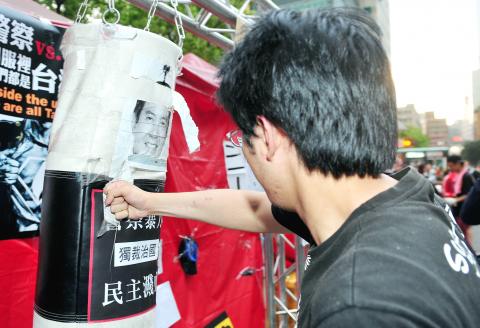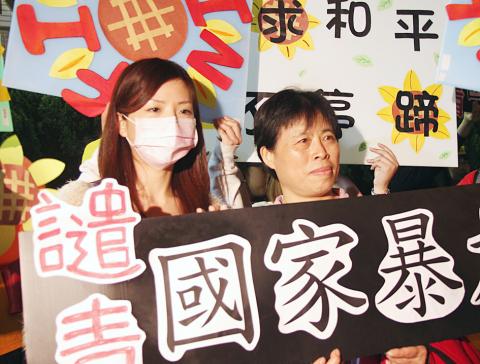|
TRADE PACT SIEGE: REPORTER’S NOTEBOOK: Social hubbub part of the Sunflower student protests
By Shih Hsiu-chuan 石秀娟 / Staff reporter

A member of the public yesterday hits a punching bag with a picture of President Ma Ying-jeou on it outside the Legislative Yuan in Taipei.
Photo: Chien Jung-fong, Taipei Times

Hung Tzu-yung, left, sister of army corporal Hung Chung-chiu, who died in July last year, yesterday holds up a sign condemning the use of violence by the government at an event at Providence University in Greater Taichung.
Photo: CNA
Go to the area surrounding the Legislative Yuan in Taipei at any time and on every corner there is always a seat to sit on, although it is not comfortable sitting on simple plastic chairs, cardboard boxes, newspapers, plastic mats or just on top of an asphalt road.
Sometimes there is also the faint odor of urine if you are sitting close to one of the portable toilets.
The compound in Taipei’s Zhongzheng District (中正) surrounded by Zhongshan S Road, Qingdao E Road, Zhenjiang Street and Jinan Road, is where thousands of people from all walks of life and from across the nation have gathered after work since the legislative chamber was occupied by students protesting against the cross-strait service trade agreement on Tuesday last week.
“Here, the people have a place of our own to voice our views,” said 33-year-old Hsieh Yi-yu (謝宜佑), who took five days off from her job in Changhua County to “do something for the kids [students] and for the next generation.”
Taiwanese had been “either too good-natured or too lazy” to leave the government in power without public supervision for too long, he said.
The government has paid no attention to people’s grievances and the students are the spark that has helped ordinary people vent their long pent-up frustrations about the government’s failure to address their concerns, Hsieh said.
“Last night, when I laid down here and watched the sky, I was really grateful for what the students have done. I am happy that they are with me,” said Hsieh, who said he used to think most people in Taiwan were politically apathetic, disengaged, and busy with their work and their personal lives.
Hundreds of students burst into the legislative chamber on Tuesday last week to stop President Ma Ying-jeou (馬英九) government’s perceived attempts to force the cross-strait service trade agreement through the legislature, one of the 21 cross-strait pacts signed since Ma took over the presidency in 2008.
The students’ movement, the culmination of months of calls by several sectors of society that the government scrap the agreement, has evolved into a mass movement both within and outside the Legislative Yuan compound.
Every evening after work, people stop by the area decorated with creative posters, leaflets, stickers, and banners, with massages and slogans to appeal to the public, or sit and join in group discussions about various topics.
Dragon Lee, 23, a medical research assistant at Chang Gung Medical Foundation in Linkou (林口), New Taipei City, who traveled by bus after work to join the rally for a third consecutive night, said he wanted to get a better understanding of the trade pact.
Lee said he was encouraged by his friends in Hong Kong to join the rally because his friends told him that Taiwan should not choose to become the next Hong Kong.
Hong Kong signed a Closer Economic Partnership Arrangement, Hong Kong’s version of service trade agreement, with China in 2003.
Sitting among the crowd, one can hear different topics being discussed by different groups, people raising questions enthusiastically and exchanging views with each other about issues related to the pact and the students’ demand that a piece of legislation be enacted to enhance legislative oversight of cross-strait negotiations.
There is both laughter and the sound of people crying.
In a voice choked with tears when speaking of the history of the colonization and assimilation of Aborigines in Taiwan, an Atayal girl was given a round of warm applause and asked to carry on her story.
“We [Aborigines] have had a history of hard times. Our languages are lost, and our cultures and identities threatened. The influx of Chinese capital would further obliterate Aboriginal culture. Aborigines’ oneness with the land would also be challenged,” she said.
Various services are also being provided at the site.
Volunteers reach out to the people asking: “Anyone need throat-soothing drops? Rice dumplings?”
While some carrying large plastic bags walk around collecting garbage.
Stalls have water, sleeping bags, blankets and batteries, among the things that are available and there are different bins for the different types of garbage.
A 19-yer-old sophomore at a university in Chiayi City surnamed Huang said she was participating in the protest because of the way Chinese Nationalist Party (KMT) Legislator Chang Ching-chung (張慶忠) took just 30 seconds to send the pact out of a legislative committee.
“That is not what I was taught about how democracy works,” she said.
“After I had been here for four days and talked to different people, I knew there were good reasons to question the trade pact economically,” Huang said.
A woman surnamed Chou (周), 27, said she was not against the trade pact, “because the company I work at does business in China.”
“Like me, many people I have spoken to here do not oppose Taiwan having trade agreements with China. However, it can’t be true that the trade pact brings only benefits to Taiwan. What are the disadvantages? We want to know,” she said as she held a placard that read: “Free shower available.”
Liu Yu-hsin (劉語欣), 25, who works in the architectural design industry, said she was worried the pact would lead to skyrocketing house prices, erosion of freedom of speech and China’s economic penetration of Taiwanse politics resulting from the opening of the service sector under the cross-strait service trade agreement.
“I am not opposed to the pact, but I hope that cross-strait relations can be advanced at a manageable pace with manageable risks,” she said.
source: Taipei Times
|